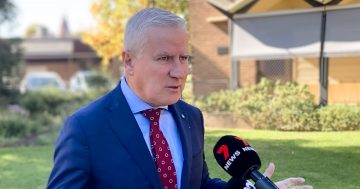
Member for Riverina Michael McCormack has raised biosecurity concerns over a decision to lift the ban on US beef imports. Photo: Michelle Kroll.
Member for Riverina Michael McCormack has questioned the Federal Government’s decision to lift restrictions on beef imported from the US.
Mr McCormack is calling for an independent review into this decision to ensure Australian farmers’ livelihoods are not put at risk.f
“I have a beef with our farmers being used as pawns in the Prime Minister’s game of chess to secure a meeting with the US President,” Mr McCormack said.
“The ban on fresh US beef was designed to protect our communities from serious biosecurity issues, including foot-and-mouth disease and prion diseases such as mad cow disease.
“These are not just minor inconveniences; they are serious and devastating diseases that could savage the Australian livestock industry.”
Restrictions were placed on beef imports from the US in 2003 after the fatal neurological disease bovine spongiform encephalopathy (BSE), otherwise known as mad cow disease, was discovered in American cattle.
At the moment, there are no reported cases of mad cow disease in Australia.
Mad cow disease damages the brain and spinal cord and primarily affects cattle, but humans who consume infected meat products can contract a human variant of the disease – variant Creutzfeldt-Jakob disease (vCJD).

Michael McCormack is at odds with the Federal Government once again. Photo: Jarryd Rowley.
Symptoms include, but are not limited to, loss of balance and coordination, slurred speech and vision problems and a progressive loss of brain function and mobility.
Most people who contract the disease succumb within a year of the symptoms starting, as the immobility issues associated can make someone more vulnerable to infection.
The biggest issue lies with diagnosing mad cow disease.
Currently, the only way to confirm a diagnosis is through examining the brain tissue by carrying out a brain biopsy, where a small sample of cells is taken from your body for testing, or more commonly, in a post-mortem examination of the brain.
A neurologist carries out tests to rule out other conditions with similar symptoms, such as Alzheimer’s, Parkinson’s or brain tumours.
Mr McCormack said there were other factors to consider.
“This announcement raises more questions than it answers – there needs to be more transparency from this government to show it has done the work to ensure the significant risks are minimised,” he said.
“Australia should never compromise on the quality of its produce, either for domestic use or for exporting.
“This is just the latest in a long rap sheet of questionable decisions that have been made against the interests of regional, rural and remote Australians, and our farmers and communities deserve better.”








